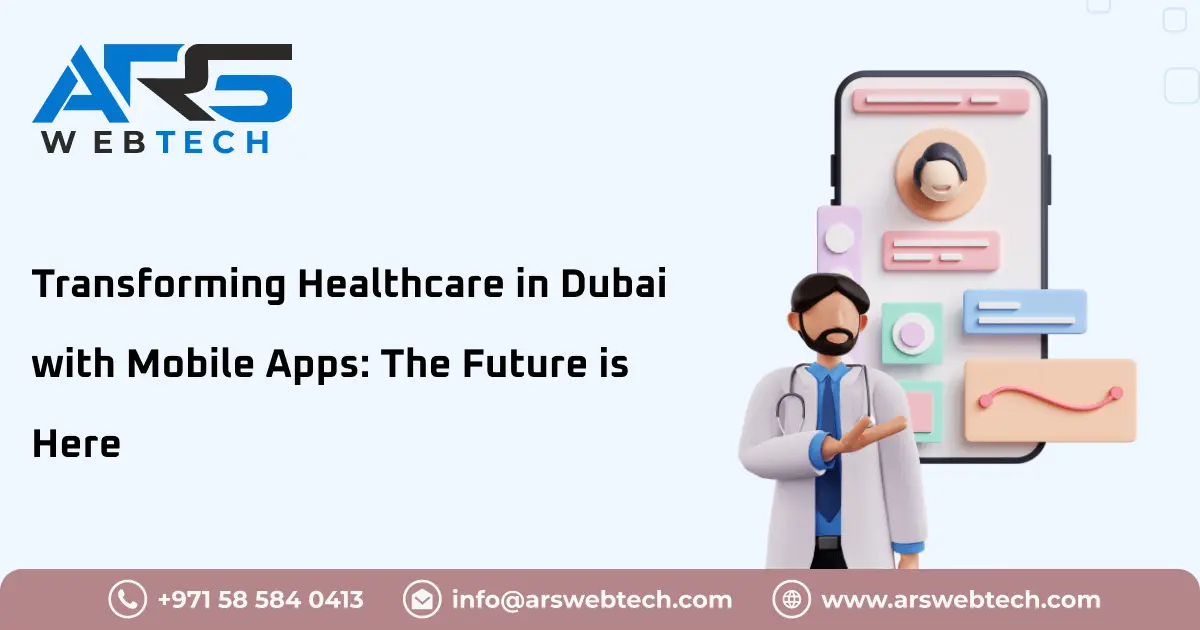Mobile Android app development has revolutionized numerous industries, and healthcare is no exception. The ability to integrate computing and communication functions into handheld devices like smartphones and tablets has significantly enhanced how healthcare services are delivered. Today, many tasks that healthcare providers once performed with a pager or telephone can be seamlessly executed via mobile apps, making healthcare more accessible and efficient than ever.
The Impact of Healthcare Mobile Apps in Dubai
As the world rapidly adopts mobile technology, Dubai is no different. Healthcare professionals and patients alike are leveraging mobile apps to improve medical services. Let’s explore how mobile apps are transforming healthcare for patients, doctors, and other medical professionals, highlighting the essential features and emerging technologies in this field.
Market Overview
The healthcare sector is capitalizing on the growing popularity of smartphones and tablets by promoting the use of healthcare mobile apps. These apps provide users with a convenient way to monitor their health, connect with medical professionals, and access medical information. This technology empowers patients, improves patient engagement, and enhances health outcomes, streamlining the entire healthcare system.
Market Expansion and Size
The healthcare mobile app market has seen exponential growth. It is valued at $11.17 billion in 2020 and is projected to reach $205.57 billion by 2028, growing at a compound annual growth rate (CAGR) of 34.6%.
Adoption by Users
A survey revealed that 76% of Americans have used a healthcare mobile app at least once. The primary uses include:
Tracking health data (52%)
Making appointments (48%)
Accessing medical records (43%)
Corresponding with healthcare professionals (36%)
Benefits of Mobile Apps in Healthcare
For Patients
Improved Communication and Patient Care
Healthcare mobile apps enhance patient care and communication between patients and providers. They facilitate appointment scheduling, medication reminders, mobile access to medical records, and remote consultations with specialists. This seamless communication ensures that patients receive timely care, strengthening the patient-provider relationship.
Increased Accessibility
Mobile healthcare apps make it easier for patients to access healthcare services. With a few taps on their smartphones, patients can communicate with doctors, monitor their health, and access critical health information anytime, anywhere. This is particularly beneficial for those in remote areas with limited access to healthcare facilities or those managing chronic conditions.
Enhanced Treatment Compliance
Mobile healthcare apps are instrumental in improving patient adherence to treatment regimens. By providing educational resources, tracking progress, setting goals, and sending prescription reminders, these apps help patients stick to their prescribed treatment plans, resulting in better health outcomes and reduced hospital readmissions.
Promoting Preventive Healthcare
Preventive care is crucial for maintaining health and preventing chronic diseases. Healthcare apps encourage regular health checks, vaccinations, lifestyle changes, and early interventions through interactive features. By following evidence-based preventive care guidelines on these platforms, patients can take proactive steps to manage their health.
For Healthcare Professionals
Improved Patient Care
Mobile healthcare apps provide healthcare professionals with instant access to test results, medical histories, patient records, and other vital data. This instant access enables faster and more accurate clinical decisions, improving patient care quality.
Better Communication
Healthcare apps facilitate seamless communication among doctors, patients, and other healthcare workers. Features like secure messaging, video consultations, and appointment booking enhance communication, ensuring timely patient care. These apps enable doctors to interact with patients remotely, collaborate with specialists, and share information with peers.
Remote Patient Monitoring
Telemedicine and remote patient monitoring technologies allow doctors to monitor patients' health remotely. Using connected devices, patients can have real-time data on vital signs, symptoms, medication adherence, and lifestyle factors collected and shared with their doctors. This capability enables healthcare providers to track patient progress and take timely action when necessary.
Increased Patient Engagement
Mobile healthcare apps empower patients to actively participate in managing their health. Doctors can recommend these apps for tracking symptoms, medications, diet, exercise regimens, and other health-related activities. By encouraging patient engagement through mobile apps, physicians can improve treatment outcomes and adherence to treatment programs.
Popular Healthcare App Features for Professionals:
Appointment Scheduling and Notifications: These tools reduce administrative burdens by enabling online appointment scheduling and sending reminders to patients, reducing missed appointments and increasing productivity.
Access to Electronic Health Records (EHRs): Integration of EHRs allows healthcare professionals to access comprehensive medical histories, including allergies, prescriptions, test results, and past diagnoses, facilitating accurate and timely treatment decisions.
Telemedicine Capabilities: Telemedicine features enable remote consultations, making healthcare accessible to patients in rural areas, those with mobility issues, or those who cannot take time off work for appointments.
Prescription Management: Electronic prescription capabilities reduce the risk of errors associated with handwritten prescriptions and check for allergies, drug interactions, and other contraindications, ensuring patient safety.
Patient Education: Healthcare apps provide reliable and accurate information about illnesses, treatments, and self-care practices, reducing misinformation and improving patient outcomes.
ARS Webtech: Leading the Charge in Healthcare App Development
At ARS Webtech, we understand the critical role mobile apps play in transforming healthcare. As a top mobile app development company in Dubai, we are committed to creating innovative solutions that enhance patient empowerment, expand access to care, and promote better health outcomes. We ensure healthcare providers have a robust online presence to engage with patients and deliver exceptional digital experiences.
Conclusion
Mobile apps are revolutionizing the healthcare industry by enhancing patient empowerment, expanding access to care, and promoting better health outcomes. With companies like ARS Webtech leading the way, the future of digital healthcare looks promising. Embrace the change and discover how mobile apps can transform your healthcare experience today.
FAQs
How safe are mobile apps for healthcare?
Reputable companies develop mobile apps that adhere to stringent security guidelines to protect patient data and ensure HIPAA compliance.
Can mobile apps replace traditional healthcare services?
While mobile apps are a valuable addition to traditional healthcare services, they can only partially replace in-person medical care. However, they significantly enhance convenience and accessibility.
How can healthcare providers use mobile apps to increase patient engagement?
Healthcare providers can improve patient engagement by incorporating features like telemedicine, appointment scheduling, and health tracking into their apps, fostering better communication and patient involvement.
Last Updated at: 01-06-2024






